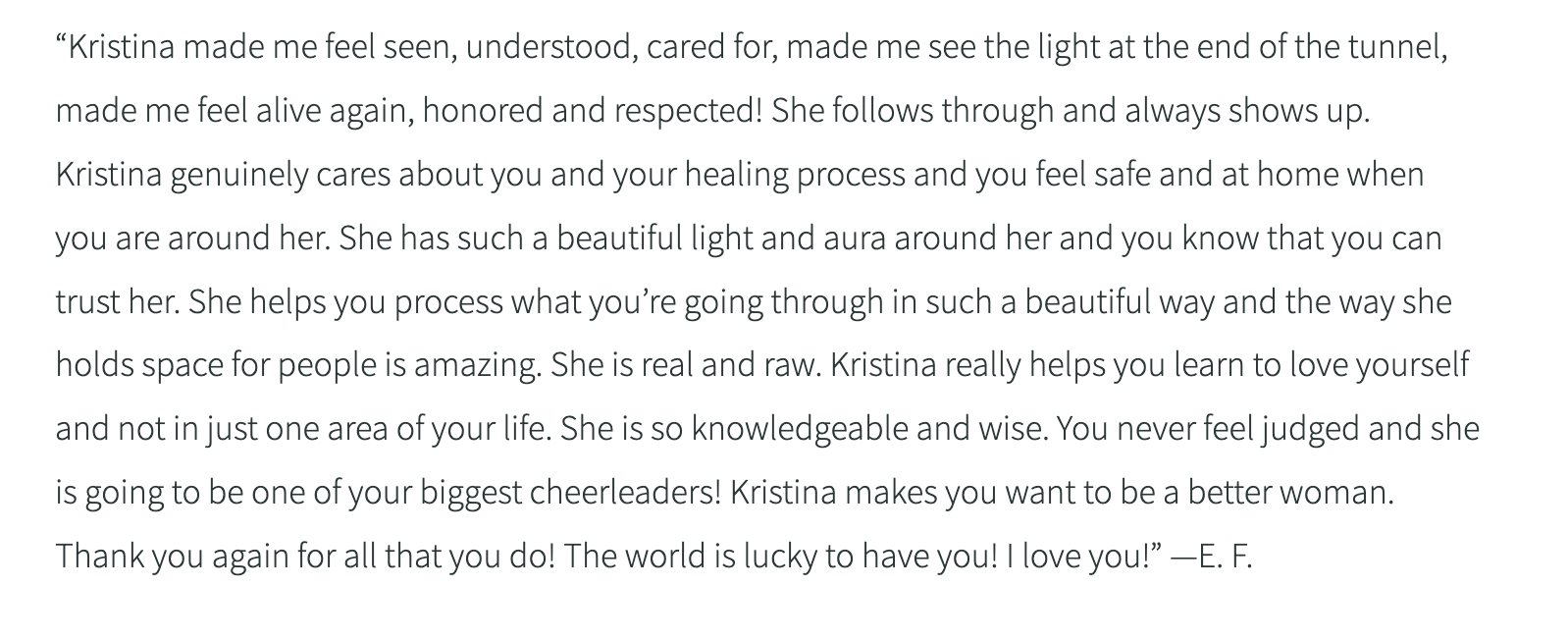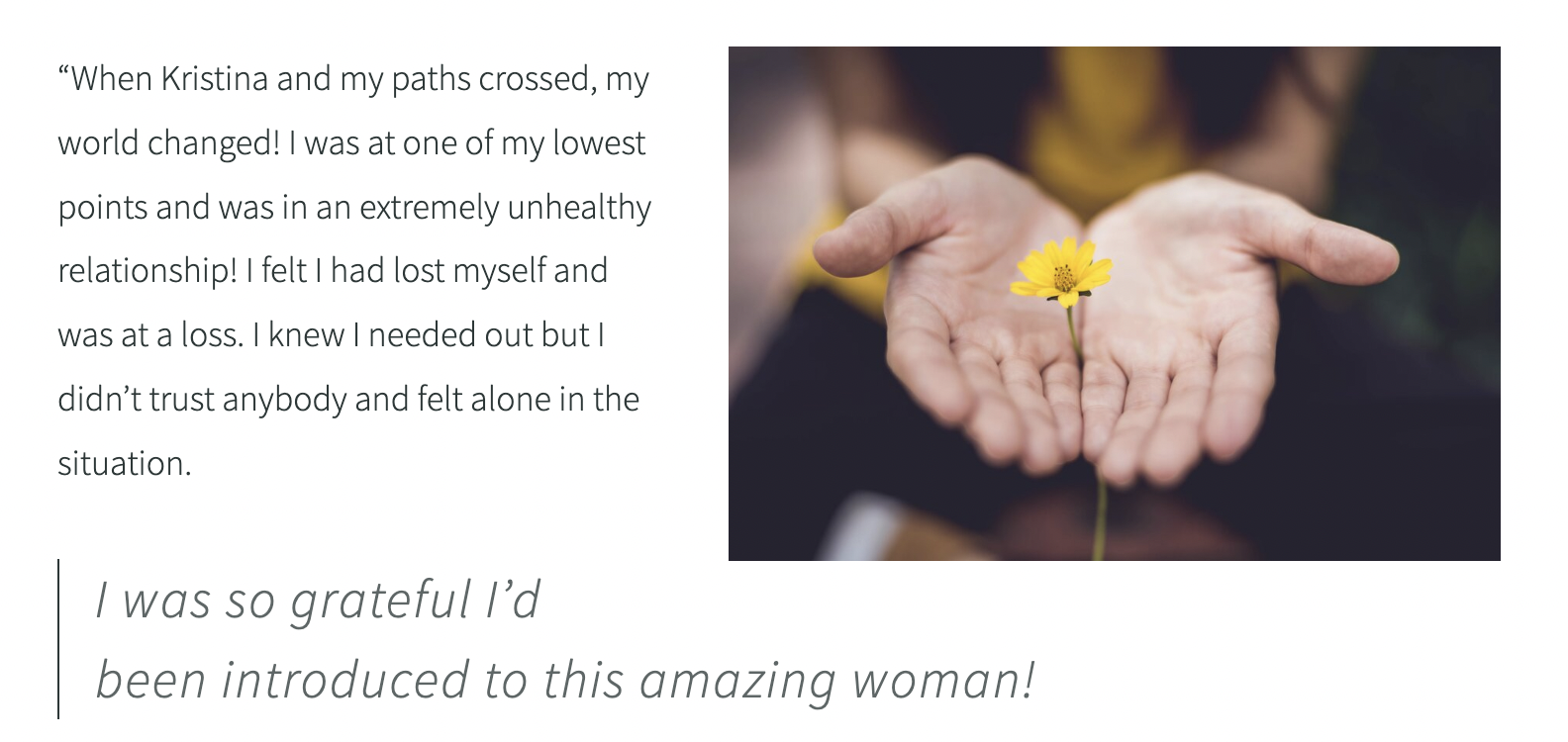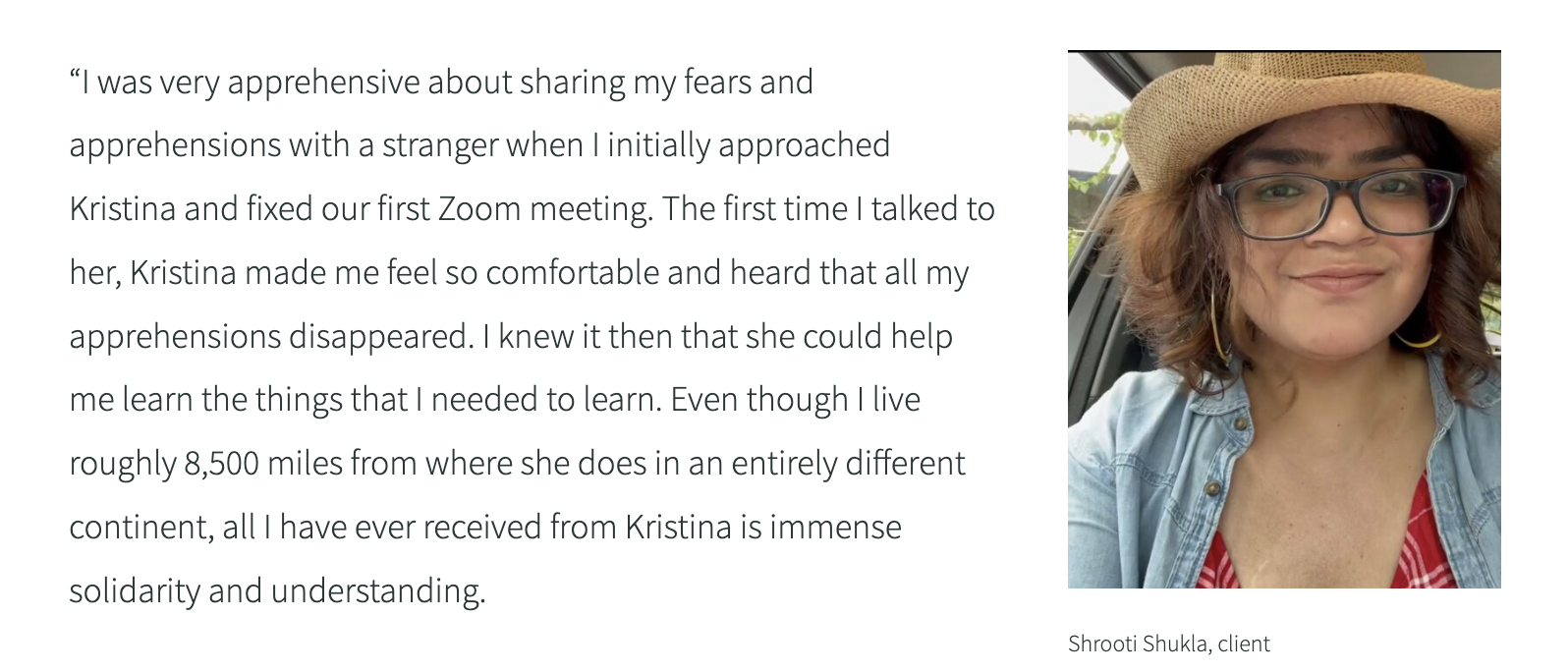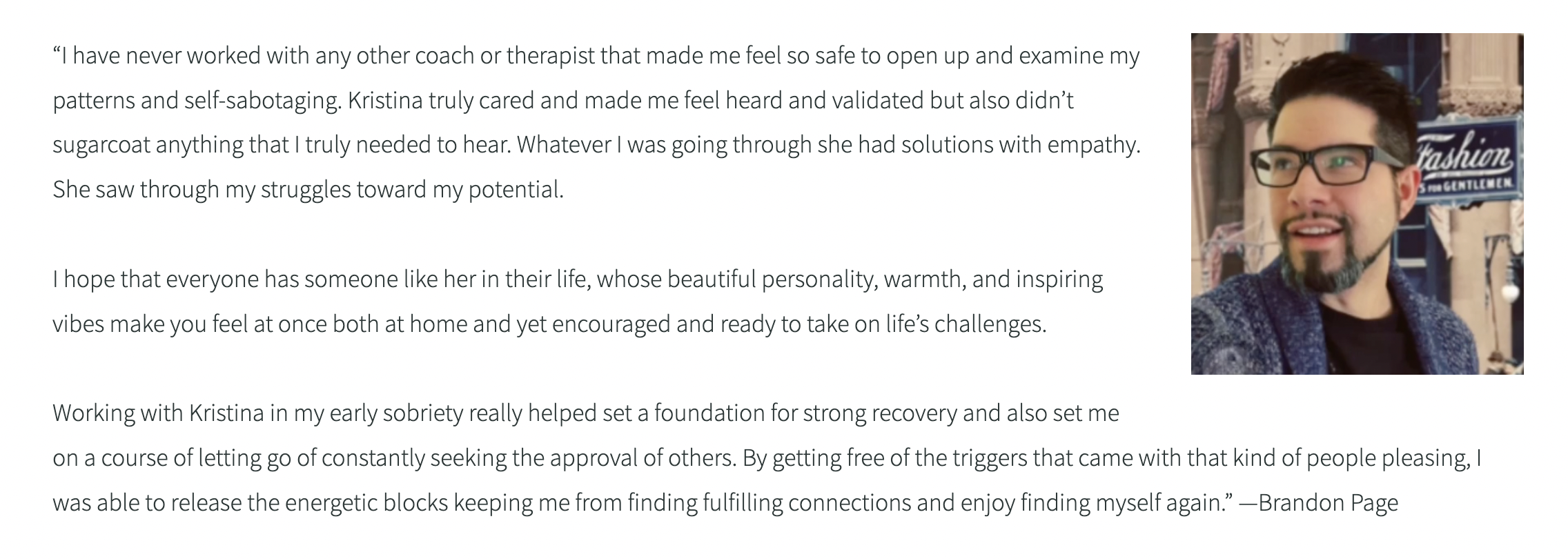Hi! I’m Kristina.
I’m so happy that you’ve taken this step toward healing your mental health and relationships! Recovering from codependent behavior is wholly possible and I’m more than excited to show you how. In my free program you will learn how to change from simply codependent surviving to…
Integrated Thriving
35 Questions to Rediscover You
These questions are the start of your new life!
I’ve created this empowering introductory program for people who want to learn how to recover from codependency and strengthen their relationship skills!
Codependents tend to be extremely kind and loving people.
As recovering codependents we are capable of much love for others. I’m not suggesting you change that part of you. The good news is that with patience, commitment, and guidance, we can also grow to love ourselves.
Loving yourself and others in a healthy way is a skill that you can learn.
To begin to recover, we need learn to examine and change our thinking and behaviors in relationships. This requires a commitment of both time and energy. It does not (and should not) happen overnight, but with some time and patience, the rewards are huge.
Write it Down
Need a place to keep notes and keep track of your progress? Buy my Love Your Life Journal (use discount code THRIVE for half off)!
What to expect from this program
You get a customized self care plan of specific, daily, actionable Personal Care Activities to begin the practice of focusing on yourself.
We’ll look at the definition of codependency in our world today.
You will identify your symptoms with my Codependency Quiz.
You will complete a 35 question form that allows us to examine your specific history and assess your current relationships to gain clarity. Finally, we will work to define your future relationship criteria.
Now what? Keep the momentum going, take action, and continue your journey by hiring me on a regular basis to work on-one-on with you. Go even further and get to the root causes, get even clearer about your current challenges, and make a plan to find long term solutions.
Take the Quiz!
Do you have symptoms of codependence? Click here to find out!
Personal Care Activities
For many of us this will feel very foreign, go against the grain and maybe even selfish. How is this work going to fix my relationship (or lack of a relationship)? I know it’s confusing, but before we can heal we’ve got to make it safe for true selves to get honest.
A daily practice of Personal Care Activities is the foundation for your transformation from codependency to thriving. Many of us arrive at our breaking point by ignoring our daily needs. Recovering from codependency is difficult, challenging, and intense so I suggest a daily practice to get in the right mindset to heal. You will choose one emotional, spiritual, and physical activity to do every day, perhaps incorporated into your daily morning routine. My Personal Care Activities help pave the way and give you the strength to persevere through the healing process.
Committing to three Personal Care Activities as part of your self care plan allows you to take action right away on a path to self empowerment.
The following self empowerment activities are meant to become part of your daily practice and ultimately part of your lifestyle. Ideally, you should commit to doing one thing in each of the three categories every day. One emotional, one spiritual, and one physical. Every day.
Please note:
It may be helpful for you to find an accountability partner. Sharing your journey with someone can help keep you on track. There are three categories of activities.
photo by Hannah Busing
Emotional Activity
photo by Freestocks
An emotional activity that you can commit to that will nurture your self. These activities must be focused on ourselves. It’s vital that these activities are not linked to productivity such as cleaning your house so you can feel good about getting something done. So often we have pushed ourselves past our limits and abilities by attaching worth to producing above everything else. We must practice doing things for ourselves simply for the sake of bringing joy into our lives. We must teach and condition our nervous system to not only protect ourselves but to also begin to heal it. These activities might look like reading a book, listening to your favorite music, taking a bubble bath, or watching a comedy show. Make a note of an emotional activity that you can commit to on a daily basis.
Spiritual Activity
What is a spiritual activity that you can do to connect to a higher power or source? This is especially important because as codependents we often struggle with being rightsized in our relationships believing that it is our job to help someone live and process with their feelings instead of focusing on our own lives or feelings. These activities might be praying, journaling, meditating (click here for my free guided meditation), grounding (sticking your feet directly on the ground). Make a note of a spiritual activity that you can commit to daily.
Physical Activity
photo by Juan Camilo Navia
What is a physical activity that you can do to take care of your body? These activities might be eating real, whole foods, drinking plenty of water, sleeping at least eight hours, exercising, stretching, and dancing. Make a note of a physical activity that you can commit to daily.
Many of my examples can overlap and be in more than one of the categories. For example, dancing can be both emotional and physical. I recommend that you nevertheless commit to three different activities.
Can’t wait to get personalized coaching and want to schedule a session now? Click here to view and sign up for my one-on-one programs:
〰️
Can’t wait to get personalized coaching and want to schedule a session now? Click here to view and sign up for my one-on-one programs: 〰️
What is codependency?
The official definition of codependency is “co·de·pend·ent /ˌkōdəˈpend(ə)nt/ noun: excessive emotional of psychological reliance on a partner, typically one who requires support of an illness or addiction.” The term codependent originated in the program of Alcoholics Anonymous as a way to describe the partners of alcohol abusers. It was used to describe the way partners were addicted to their addicted partners. It has since become a common way to describe maladaptive behaviors within a relationship that keep each party dependent on the other.
This definition feels right to me:
Codependency is a behavior pattern of focusing on someone else’s needs instead of our own.
As the term codependent became more mainstream it’s been mistakenly and unfairly used to describe a weak, needy, clingy, and even emotionally sick person. I’ve found this to not be the case as most codependents are actually quite strong and may simply be struggling to maintain healthy relationships.
Take the Quiz!
Do you have symptoms of codependence? Click here to find out!
More about codependency
Codependent behavior often begins in childhood as coping mechanisms and behaviors that work to deal with caregivers who might also be codependent and therefore abusive, and you need to simply survive the situation.
Codependents are not born, they’re made.
photo by John-Mark Smith
It’s natural to start out completely dependent and rely on our caregivers to supply us with our needs. However, to remain dependent on others is not healthy for an adult. Why do so many of our relationships become codependent? How is this behavior reinforced and perpetuated? How can we begin to break the cycle? If we examine our origin story that includes our primary relationships, we can more easily see where codependency was modeled to us. Our caretakers may also have had codependent relationships based on enmeshment instead of love and so they taught us this behavior at an early age. If you had a caregiver that manipulated you into acting a certain way to gain their approval and love, you may grow to believe that codependence is love.
photo by Felipe Bustillo
Codependency is pervasive.
Even our society’s art, movies, and songs are glaring examples of codependent love. Our society perpetuates that we’re not whole unless we have great love. There are countless books, movies, and pop songs depicting love as the ideal cure for everything. If we find true love then our life will be worthwhile. Not being paired seems to imply that we are somehow impaired. Many believe that one of the most romantic statements of all time is when Jerry McGuire announces “you complete me.” Not being whole is a common theme throughout history. It didn’t start with that movie either classic plays like Romeo and Juliet are based on lovers committing suicide rather than going on without your love interest reinforce this idea that (reference Alain de Botton on Romanticism). The popular mindset seems to tell us that suffering and obsession equals great love.
Codependency does not just apply to romantic relationships.
photo by Priscilla Du Preez
It’s also very prevalent in parent to child connections. A very loving mother or father is based on the parent being selfless and focused entirely on putting the child’s needs and wants above anyone else. This is dangerous as it makes the child responsible for their parents happiness and well being. The child can become disillusioned and believe that in order for their parent to be happy and satisfied they must behave in a certain way. This can lead the child to resentment and anger. Eventually this may even affect major life decisions as the child grows into adulthood and choose careers, partners, etc. according to their parents wishes. They lose autonomy as their parents wishes become more important than their own. They haven’t been encouraged to even begin to know what they want or that pursuing their own choices are even an option. This affects self esteem, confidence, autonomy, survival, relationships, etc.
Your Past and present Relationships
Getting clear.
The importance of reviewing our past is key to getting clear. Where we came from has a huge impact on creating healthy relationships. In this section, we will gently dive into your past relationships and discover how we developed our codependent behaviors and habits.
35 questions to change your life.
Click here to fill out a form that reviews your past relationships. After you click the “Send to Kristina” button your answers will be sent to me and we can schedule a call to discuss areas that I can help you with!
Don’t do it alone
Whether you’re just getting started, are farther along, or you’ve hit a plateau in your long term recovery, my course provides the opportunity to get supportive, one-on-one, expert guidance in your recovery journey.
Continue your journey by hiring me on a regular basis to work on-one-on with you. Go even further and get to the root causes, get even clearer about your current challenges, and make a plan to find long term solutions.
When you hire me you get:
• Twelve one-on-one sessions (ninety minutes to two hours for each session)
• Daily check-ins with Kristina Dennis via video messaging
• Your own, unique, personalized family genogram to help you understand your biological characteristics
• Actionable, realistic tips and advice to provide extraordinary wellness for your nervous system
• Customized recovery tools and support strategies
• Successful conflict mastery ideas
• Ways to practice communicating your wants and needs within a relationship
Schedule a get acquainted call today! I work with adults to unlearn a lifetime of behaviors that are no longer useful or that no longer serve them and develop toward a life of not simply surviving, but actually thriving.
Click here to view and sign up for my one-on-one programs:













